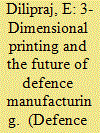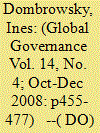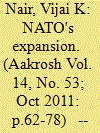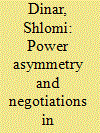|
|
|
Sort Order |
|
|
|
Items / Page
|
|
|
|
|
|
|
| Srl | Item |
| 1 |
ID:
130567


|
|
|
| 2 |
ID:
133399


|
|
|
|
|
| Publication |
2013.
|
| Summary/Abstract |
This essay describes an incident of some thirty years ago that involved relations between the United States and Japan. It stemmed from a chance encounter at sea in international waters, between a U.S. warship and a Japanese commercial vessel. If there are lessons to be learned from this event, it is that small things matter; they are like grains of sand that gum up the machinery of smooth international relations. At the time, I was defense and naval attaché to the American embassy at Tokyo, where I became involved in the situation after the fact. To my knowledge, this is how the story unfolded.
|
|
|
|
|
|
|
|
|
|
|
|
|
|
|
|
| 3 |
ID:
085328


|
|
|
|
|
| Publication |
2008.
|
| Summary/Abstract |
In recent years an emergent global policy discourse has promoted the concept of Integrated Water Resources Management (IWRM) as a strategy for the sustainable management of international waters. However, integration remains a considerable challenge in large international river basins. This article addresses the relevance of the global discourse on IWRM, asking how much integration can be expected and how much integration is desirable in international water management. The article presents a novel compilation of eighty-six international river basin organizations and examines their degree of integration in terms of three dimensions: membership, substantive scope, and form. More particularly, the article examines the integration problem from an economic perspective, asking whether integration serves the self-interest of the respective riparian states. The empirical evidence highlights the difficulties of integration, as the majority of international river basin organizations remain narrow in membership and scope. Economic considerations suggest that voluntary cooperation in river basins is institutionally demanding and that the degree of integration depends on the problem at hand. Hence, the challenge for international waters management is to search for the economically desirable degree of integration in each case.
|
|
|
|
|
|
|
|
|
|
|
|
|
|
|
|
| 4 |
ID:
109550


|
|
|
| 5 |
ID:
088929


|
|
|
|
|
| Publication |
2009.
|
| Summary/Abstract |
The La Plata River Basin in South America, whose waters are shared by Argentina, Bolivia, Brazil, Paraguay and Uruguay, provides important lessons from the long history of negotiations over its shared water and other natural resources. In particular, innovative resource management practices developed over time have led to the relative harmony in which the riparian countries coexist. In this article, we analyze negotiation techniques within the La Plata River Basin by examining in detail the processes leading to the two seminal agreements - the 1969 Treaty of La Plata Basin and the 1979 Itaipú-Corpus Agreement. Based upon our analysis of the complex and often contradictory relationships between the riparian states, we evaluate the outcomes of both treaties from the standpoint of cooperation in the region and sustainable development. In doing so, we extend the relevance of the analysis to other basins with similar issues of regional management. The article extends the basin cooperation, through negotiation, to include trade agreements and development via project partnerships that draw in regional and global actors, including non-governmental organizations, environmental lobbies in foreign countries, and multinational development banks. The above actors are relevant for many parts of the world in today's era of globalization.
|
|
|
|
|
|
|
|
|
|
|
|
|
|
|
|
| 6 |
ID:
088932


|
|
|
|
|
| Publication |
2009.
|
| Summary/Abstract |
Realist thinkers traditionally argue that when the upstream state is the river basin's hegemon, cooperation is least likely to materialize. Conversely, when the downstream state is the basin's hegemon, cooperation is likely to ensue, yet the agreement is often imposed and shaped along the interests of the stronger party. Implied in both scenarios is that the otherwise weaker riparian, in aggregate power terms, is not in a position to achieve its aims and satisfy its needs in an optimal fashion. Its capabilities are inferior to those of its adversary. In effect, it has little alternative but to accept the desires of the stronger riparian. By considering a set of international water agreements and hydro-political contexts, this article challenges the realist conception of power in international river basins. Particularly, it demonstrates that otherwise weaker states may influence the hydro-political context and subsequent international agreements. Cooperation, in general, materializes when both states, but particularly the stronger state, realize that benefits can accrue from coordination and joint action. In other words, to harness the river in an efficient manner, cooperation must ensue and the downstream state's participation is important. Even when the benefits to cooperation are not clear, i.e. when the upstream riparian does not foresee immediate economic incentives to cooperation, coordination may still be attained through the manipulation of incentives (or strategic interaction).
|
|
|
|
|
|
|
|
|
|
|
|
|
|
|
|
| 7 |
ID:
145370


|
|
|
|
|
| Summary/Abstract |
Water is useful in various uses. Today its availability is core issue. World is struggling to cope with water scarcity. Water security has vital place in the governments’ agenda. Global climatic change will affect water availability. It is predicted that by the year 2025 a full 35 per cent of the world population will be living under conditions of water scarcity or stress. Formerly internal rivers have now become international water. Since the Second World War, the total number of the world’s independent nations has doubled. Decolonization is the reason in the increase of number of International River. Non-navigational uses of waters get importance thannavigational uses.
|
|
|
|
|
|
|
|
|
|
|
|
|
|
|
|
| 8 |
ID:
106525


|
|
|
|
|
|
|
|